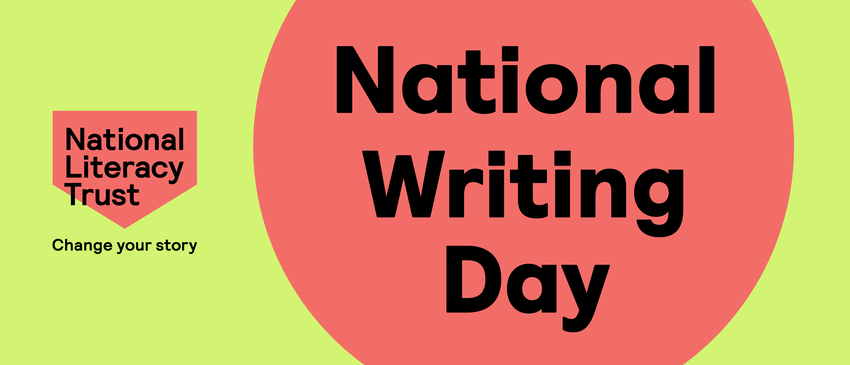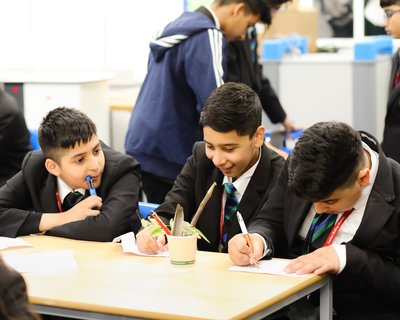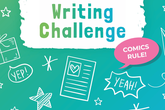National Writing Day 2025

What is National Writing Day?
National Writing Day is an annual celebration of the power of writing creatively, inspiring people of all ages and abilities to try writing for fun and self-expression.
This occasion provides a great opportunity to celebrate the reasons why young people write - including creativity, mental wellbeing, and social action or connection - and to encourage everyone to find their own writing motivation and voice.
When is National Writing Day?
The date for National Writing Day is set each year, normally falling in the third week of June.
In 2024, National Writing Day took place on Wednesday 19 June.
Read on to learn more about writing motivation and benefits, and to discover resources to help you celebrate the day.
Writing research
Our recent research in to Children and young people's writing in 2024 found that:
- Fewer than 3 in 10 (28.7%) children and young people aged 8 to 18 say they enjoy writing in their free time - the lowest levels we've recorded.
- Only 1 in 9 (11.1%) children and young people told us that they wrote something daily in their free time, halving from last year.
- Of those who write in their free time once a month, 3 in 5 (59.1%) say they write to be creative, while half write to express their ideas and imagination (52.8%) or their thoughts and feelings (47.7%).
- Interestingly, while children's enjoyment of writing at home is in decline, the opposite is true for their enjoyment of writing at school. More than half (53.6%) of children and young people enjoy the writing they do at school, a 22% uplift in the past year.
Explore all our research in to writing.
The Impact of Writing for Enjoyment Programmes
Our new report brings together insights from the various writing programmes that sit within Young Writers to highlight the important role they can play in the lives of children and young people.
Learn more in our report on The Impact of Writing for Enjoyment Programmes
Why writing is important
Writing is a lifelong skill empowering communication and self-expression. It is crucial to children and young people’s development as it enhances self-confidence and critical thinking skills, but also encourages creativity.
Writing is also part of everyday life, from making plans with friends over text or WhatsApp, helping with children’s homework, writing emails in the workplace, or even making a shopping list. However, 1 in 3 children currently leave primary school without the writing skills they need to succeed in life.
At the National Literacy Trust, we champion writing for enjoyment as a key part of supporting children and young people’s writing attainment.
Writing for enjoyment:
- supports mental wellbeing
- inspires creativity
- helps children express their thoughts and feelings
- improves writing skills.
We believe writing doesn’t just belong in an English lesson but can be used as a fun way to explore many different ideas and topics. We know that writing for enjoyment has the wonderful ability to boost children and young people's wellbeing and help them feel connected to the world. In our writing resources, you’ll find activities that will help bring writing for enjoyment into every corner of your classroom.
When we asked children and young people to tell us why they write, we identified 10 writing motivators which we grouped conceptually to form three categories of young writers:
- the creative writer
- the mindful writer
- the social writer
Our resources and writing programmes are designed for them.
National Writing Day resources
To help you mark National Writing Day - and to celebrate writing throughout the year - we created classroom resources including insights and activities for early years children as well as inspiration and ideas you can use with pupils aged 4 to 14.
Writing for pleasure activities for schools
This resource provides an innovative range of classroom writing games, prompts and ideas you can use in primary or secondary schools to celebrate writing, reflect on reasons for writing and encourage everyone to find their own motivation and voice.
The writing activities align with the statutory requirements of the English programmes of study: Key stages 1 and 2 National Curriculum in England) which states that pupils should be taught to develop positive attitudes towards and stamina for writing by:
- writing narratives about personal experiences and those of others (real and fictional)
- writing about real events
- writing poetry
- writing for different purposes.
Supporting writing in the early years
For children in early years settings, we know that early experiences of writing will have significant influence on their views and feelings about writing as they get older and learn the necessary skills to become successful writers. Our resource explores how to support children in their earliest years to develop a positive view of themselves as writers, develop an interest in the purpose of writing, and to begin to recognise the power of writing as a tool for communication.
Early years activities supporting writing
More writing resources
Explore the resources linked below to discover classroom ideas and session plans aligned to creative, mindful and social writing.
Creative writing
-
Teaching sequence and resources to run our Comics Rule! writing challenge in your classroom, exploring the exciting world of comics and graphic novels.Learn more
-
We developed these Comedy Classroom resources in partnership with BBC Learning. They provide a framework to explore comedy writing with pupils while enjoying plenty of...Learn more
-
Writing from Silence is a combination film and writing for enjoyment resource. The film takes pupils on a journey into the past, through an interactive tour of the National...Learn more
Mindful writing
-
Created in partnership with the RSPB the Writing from Nature resources are designed to widen access to, deepen knowledge of, and increase appreciation of the natural world...Learn more
-
Set up a writing club in your school to help establish a whole-school writing culture.Learn more
-
Ideas and activities to support your school in using diaries as an introduction to autobiographical writing and as a way of promoting family and community engagement.Learn more
Social writing: making connections
-
Support wellbeing and writing with this challenge from author Rutendo Tavengerwei.Learn more
-
Writing letters for your local care home can help to combat loneliness among older adults while increasing pupils' motivation to write.Learn more
-
Created by the National Literacy Trust for Premier League Primary Stars, Premier League Magazine Team is a free literacy programme to support KS2 pupils’ writing.Learn more
Writing programmes
Our writing programmes for schools inspire children and young people to write for enjoyment and help them to improve the quality of their writing.










Social writing: championing change